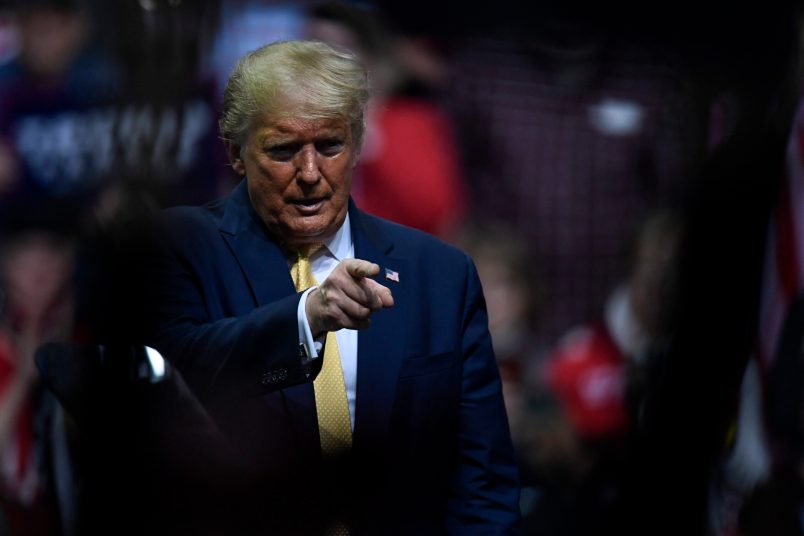The Colorado Supreme Court heard arguments on Wednesday in a key case seeking to knock Donald Trump off the ballot for violating the Constitution’s Disqualification Clause. The justices grilled both sides in a hearing that left it unclear how they might rule on the issue.
Justices focused throughout on whether their court was even in a position to decide on the matter.
A Colorado district court ruled last month that Trump had engaged in insurrection under Section Three of the 14th Amendment, but found that he did not fall under the Disqualification Clause because the president is not an “officer” of the United States.
Justice Melissa Hart, speaking about the insurrection finding, asked an attorney for the group seeking to disqualify Trump whether the lower court “had jurisdiction” to make the ruling. Justice Richard Gabriel asked whether courts could even decide to knock someone off the ballot.
Eric Olson, a former Colorado solicitor general representing Citizens for Responsibility and Ethics in Washington (CREW), the good government group which brought the Colorado lawsuit, argued in response that the court had a duty to resolve the question like it would any other questions around qualifications: age, citizenship, or other criteria.
Different states already have different procedures for disqualifying candidates for various reasons, Olson added. In California, such challenges can be brought post-election, he remarked, while other states require challenges to be brought before voting begins.
“Some uncertainty is built into the system,” Olson said.
CREW’s lawsuit has gone further than several other attempts in states across the nation to have judges make a finding that Trump engaged in an insurrection, and thereby order the state not to list him on election ballots. Another good government non-profit, Free Speech for People, has filed lawsuits to the same end in Oregon, Minnesota, and Michigan. Of those, the Michigan case is on appeal while the Minnesota case was dismissed until after the primaries.
Trump was represented in the Colorado arguments by Scott Gessler, a former Colorado Secretary of State.
Gessler addressed questions from the judges on a similar topic: what standard could a court use to disqualify candidates who had engaged in insurrection?
Trump attorneys in the Disqualification Clause cases have warned of “chaos” and the prospect of 50 states each deciding differently who should appear on the ballot, and how. Gessler did the same, leading to Justice Gabriel raising points made by CREW: each state conducts its own election.
“I’m not sure we have the crisis you suggest,” Gabriel remarked.
Gessler replied that the states have “different procedures,” but not the “substantive application of a disqualification standard.”
Justice Gabriel then asked if states had the power to disqualify candidates over a more common criteria: age.
“I don’t think there’s statutory authority for them to do that,” Gessler replied.
From there, the justices began to ask what standard, then, could exist to determine when candidates can be disqualified.
“If it’s a factual question, then the secretary can’t? But if nobody doubts it, then they can?” Justice Gabriel remarked. “That’s a tough standard.”
At another point, Justice William Hood asked whether the Supreme Court of the United States would ultimately decide what the standard should be, if the Colorado court were to disqualify Trump.
“President Trump would certainly think that, yes,” Gessler replied, adding, “I don’t think that the court should rely on the hope that the U.S. Supreme Court would step in.”
The lower court judge who found that Trump engaged in insurrection held back from disqualifying him only because she found that the “officer” provision of the 14th Amendment did not apply to former Presidents who took an oath to the Constitution only to betray it. That judge, Sarah Wallace, specified in her ruling that she made the finding in part out of “reluctance” to “disqualify a presidential candidate without a clear, unmistakable indication that such is the intent of Section Three.”
Gessler maintained that the drafters of the amendment “made a choice to exclude the president by using specific language.” Justice Monica Marquez replied by saying that she “saw no rational reason for that type of an exclusion,” and asked what the “rationale” would be for it.
“The drafters of Section [three] made those choices in that era,” Gessler replied.
At another point, Gessler argued that the president, as the unique official elected by the whole country, should escape the focus of the amendment.
“If the entire nation chooses someone to be president, is that insurrection? Or is that a democratic choice?” Gessler asked.







I hope that the secrecy is that they want to get it right… without being hounded until their decision is made. There is a lot riding on the case. I am not a court whisperer. I think it is better to ask the tough questions now rather than to have the decision overturned.
No. His being elected in 2024 would not be insurrection. The insurrection occurred in 2021.
No, it would not be a democratic choice, given the role of the Electoral College and the effects of gerrymandering.
Wow, a kitty pic AND Melissa Hart!
More punting than the Chargers vs Patriots game last weekend.
The president is not an officer of the US? The president of a bank is an officer of the bank, no? The presidency is an office, yes? Don’t we say that candidates for the presidency are “running for office”? The Constitution calls it an office (Article II, Section 1, Clause 8):
So isn’t the the holder of an office an officer?
I begin to think that Mr. Bumble was right: The law is a[n] ass.